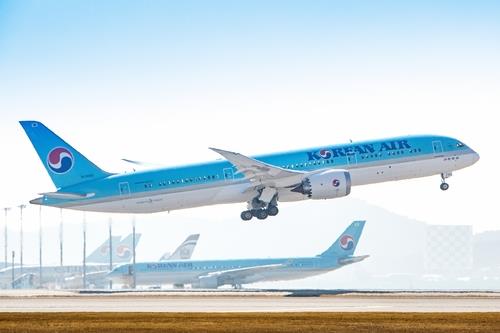
SEOUL, Feb. 18 (Yonhap) — The European Union (EU) has begun the final stage of an investigation on Korean Air Co.’s proposed integration with smaller local rival Asiana Airlines Inc. in order to decide whether to approve the deal.
The European Commission said it has opened an in-depth investigation of the deal in a press release posted on its homepage Friday (Belgium time).
It conducted the first-stage review of the deal based on documents submitted by Korean Air last month.
The commission said the deal could reduce competition in the passenger and air cargo transport services on four routes between South Korea and the EEA (European Economic Area) as a reason for opening the in-depth investigation. It specifically cited the two companies’ positions as the country’s largest and second-largest airlines.

This undated file photo offered by Korean Air shows a B787-9 taking off from a local airport. (PHOTO NOT FOR SALE) (Yonhap)
In November 2020, Korean Air signed a deal to acquire the controlling stake in Asiana in a deal valued at 1.8 trillion won (US$1.42 billion) that would create the world’s 10th-biggest airline by fleet.
Korean Air, currently the world’s 18th-largest airline by fleet, will become Asiana’s biggest shareholder with a 63.9 percent stake if the acquisition is completed.
It has since submitted documents to antitrust regulators in 14 countries for the review of its combination with Asiana and received approval from 10 countries — Australia, South Korea, Singapore, Vietnam, Thailand, Turkey, Taiwan, Malaysia, the Philippines and China — so far. The four remaining territories are the EU, the United States, Japan and Britain.
The EU will decide by July 5 whether to approve the deal or not.
The four routes mentioned by the EU are those to Paris, Frankfurt, Rome and Barcelona, Reuters reported, citing unidentified sources.
The combined market shares of the two South Korean airlines were 60 percent on the routes to Paris, 68 percent to Frankfurt, 75 percent to Rome and 100 percent to Barcelona as of 2019.
According to the commission, the two companies did not submit remedies to address the EU concerns during the first-stage investigation for efficiency. The examination period can be extended by 10 days if the remedies are submitted in the first stage.
Korean Air plans to submit them in the second stage, so it can fully discuss and revise them if necessary with the EU.
But some analysts say that Korean Air’s failure to submit the remedies so far could be a sign of difficulties in the screening process.
[email protected]
(END)






